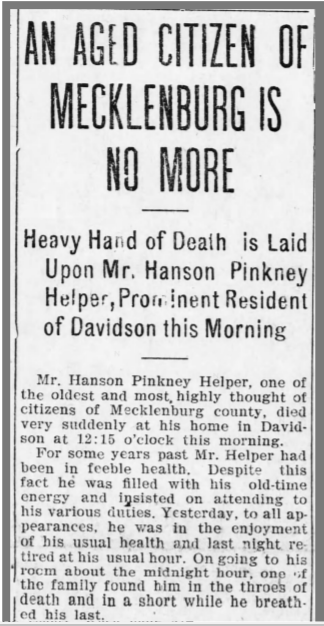In Fall 2019, Archives, Special Collections, & Community (ASCC) had the privilege of working with Dr. Rose Stremlau’s “HIS 306: Women and Gender in U.S. History to 1870” course. Over the course of a semester, students researched the history of women and gender in the greater Davidson, North Carolina area using materials in the Davidson College Archives and other local organizations. The following series of blog posts highlights aspects of their research process.
I am Cecelia Miller, a sophomore History major with a pre-medical studies focus from Orlando, Florida.
While researching women in the town of Davidson during the 1800s, I stumbled across the legacy of the Helper family, a name not generally known by our student body. Many of us walk by the Carolina Inn daily, not knowing the family behind it. Hanson Pickney Helper (1825-1902) served as the postmaster, innkeeper, and shopkeeper in Davidson. While he played integral roles in the college and the town, it’s his relationship to one of the most loathed men of the South that demands more investigation.

Chalmers G. Davidson, a history professor and author at Davidson, detailed this relationship in his short piece written about the history of the hotel.1 Apparently, Hanson’s brother was the (in)famous Hinton Rowan Helper, author of The Impending Crisis of the South. Hinton Helper’s book is still largely considered to be the most effective attack of the South to come from the South itself. Davidson explained that Hinton made an economic argument against slavery, declaring slavery was holding the South back from economic progress. His appeal to poor white farmers angered many Southern leaders, while Northern abolitionists used the piece as propaganda.
Through Davidson’s writing, as well as Hanson’s obituary, it’s clear Hanson was a respected member of the community. Davidson explains that Helper was known as “Mr. Pink” by students, known to engage in games with students, and considered very pleasant and intelligent. His obituary described him as “one of the oldest and most highly thought of citizens of Mecklenburg county” as well as an “important factor in the business and social life in Davidson College.”2 The obituary also details his surviving relatives in excruciating detail—with one notable exception—Hinton Rowan Helper.
Taken together, these sources reveal the status Hanson Helper had in the community. Students appreciated his spirit and engagement, the town relied on his businesses, and the county commission board welcomed his business expertise. Davidson College appreciated him as well, accepting a loan from him in the 1870s.3 It is interesting to consider this respect and dignity in contrast with the feelings of hatred and furor the community must have felt for his abolitionist brother—especially because it appears that Helper’s community standing was not tarnished by his brother’s condemnation of slavery.
I speculate that Helper specifically tried to avoid public association with his brother. First, Chalmers Davidson notes that it is not quite known what Helper thought of his brother as Helper “kept to his own counsel.” Second, upon Helper’s death in 1902, brother Hinton was still alive, and would be for another five years, yet Hanson’s obituary, which includes a rather extensive list of surviving and deceased family, fails to count Hinton as a surviving relative. This omission seems intentional—and begs the question: did Hanson Helper avoid association with his brother to maintain his esteemed image in his conservative southern community?
Works Cited:
[1] Chalmers G. Davidson, “Lives of the Wayside Inn,” The State, November 15, 1971. Davidson College Archives, Davidson, NC.
[2] “An Aged Citizen of Mecklenburg Is No More,” The Charlotte News (Charlotte, NC), October 2, 1902, North Carolina Collection Archives.
[3] Jan Blodgett and Ralph B. Levering, One Town, Many Voices: A History of Davidson, North Carolina (Davidson, NC: Davidson Historical Society, 2012), 44.

Speak Your Mind